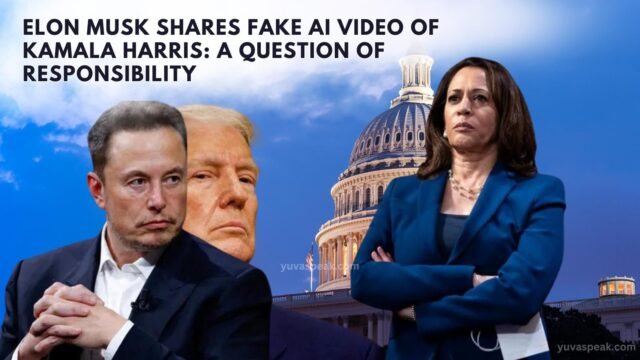In a surprising and concerning turn of events, Elon Musk, a vocal supporter of Donald Trump and the Republican party, recently shared a fake AI-generated video of US presidential candidate Kamala Harris on his social media platform, Twitter. The incident has raised serious questions about the responsibilities of influential tech leaders in the dissemination of information.
On 27-07-2024, Elon Musk tweeted a video purportedly showing Kamala Harris in a misleading situation with a bad representation of her . However, it was soon discovered that the video was an AI-generated deepfake, designed to manipulate the viewer’s perception of the Democratic candidate. The video, which lacked any factual basis or context, was quickly debunked by fact-checkers and media outlets.
This is amazing 😂
pic.twitter.com/KpnBKGUUwn— Elon Musk (@elonmusk) July 26, 2024
Elon Musk’s Political Stance
Elon Musk’s support for Donald Trump and the Republican party is well-documented. He has often used his platform to voice his political opinions and endorse candidates aligned with his views. His influence, given his position as the CEO of Tesla and SpaceX and owner of Twitter, cannot be understated. When a person of his stature shares content, it reaches millions and can significantly impact public opinion.
Twitter, under Musk’s ownership, has become a major player in the dissemination of news and information. The platform has faced criticism in the past for allowing the spread of misinformation and fake news. Musk’s recent action of sharing a fake AI video further exacerbates these concerns. As the owner of one of the biggest tech and news platforms, Musk’s actions carry weight, and his decision to share a misleading video without verification is seen as highly irresponsible.
Don’t you think that maybe it’s a little bit irresponsible to be sharing a manipulated video like this in the middle of an election?
I get that you have your own political leanings, and I completely respect that but as the owner of this platform, isn’t it a bit of a mockery… https://t.co/NuUb2C1TU6
— Brian Krassenstein (@krassenstein) July 26, 2024
The incident also highlights the growing threat of deepfake technology. These AI-generated videos can be incredibly realistic and convincing, making it difficult for the average viewer to discern truth from fiction. The misuse of such technology can have serious implications for political campaigns, public trust, and the integrity of democratic processes.
Musk’s decision to share the fake video has drawn widespread criticism from various quarters. Critics argue that as a leader in the tech industry, Musk has a responsibility to ensure that the information he shares is accurate and credible. By sharing the deepfake video, he has not only misled his followers but also contributed to the spread of misinformation.
Conclusion
The sharing of a fake AI video of Kamala Harris by Elon Musk is a stark reminder of the power and responsibility that comes with influence. In an era where misinformation can spread like wildfire, it is crucial for leaders, especially those with significant reach and impact, to exercise caution and ensure the authenticity of the content they disseminate. As technology continues to evolve, the need for vigilance and accountability in the use of such powerful tools becomes even more paramount.








